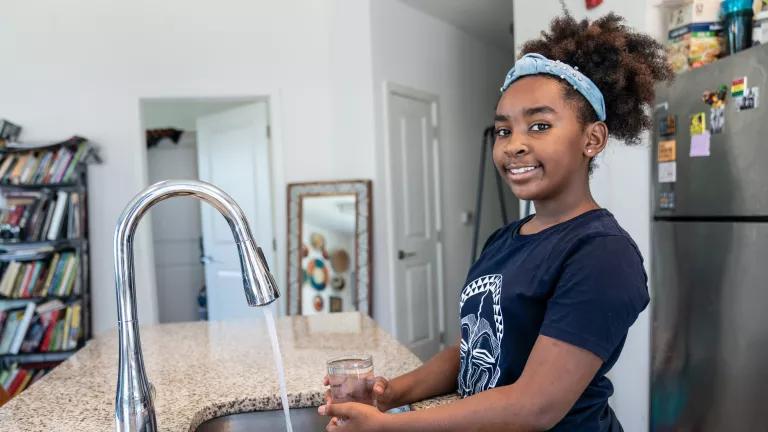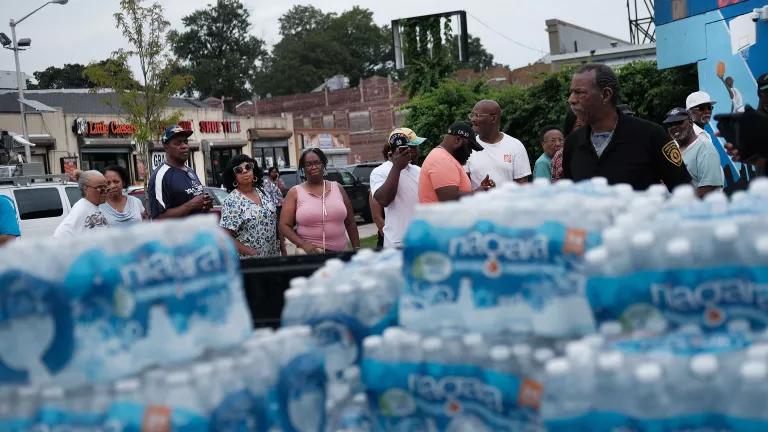
Nearly two and a half years ago, the City of Flint’s history was forever marked when unelected state officials, in an effort to cut costs, switched Flint’s water source from Detroit’s Lake Huron to the Flint River. Remarkably, on the eve of a new federal fiscal year in a presidential election season, Congress last week failed to make a decision on an official Flint aid funding level, punting that decision to the congressional lame duck session. While such long-term aid is critically needed, the immediate crisis in Flint is dire. Unfiltered tap water is still unsafe to drink; not enough is being done to ensure that all Flint residents are able to access safe drinking water today.
Federal court intervention is needed.
Last month, NRDC lawyers presented testimony in live court to make this point. Over the span of 10 hours, the federal district court in Detroit, Michigan, heard evidence and testimony from residents, experts, volunteers and community leaders, detailing how residents continue to struggle every day to obtain sufficient and consistent bottled water and to install and maintain faucet filters properly. The hearing was held in response to a motion we filed in March 2016 on behalf of Concerned Pastors for Social Action, Melissa Mays, ACLU of Michigan and NRDC. In our motion, we sought an order requiring the City and state officials to implement a targeted door-to-door bottled water delivery system in Flint.
At the hearing, four witnesses shared their stories.
Michael Hood, Executive Director of Crossing Water, testified how he and his group, including volunteer social services and other providers, have visited approximately a thousand homes in Flint since January 2016. Crossing Water is a volunteer, rapid response network set up in the wake of the crisis to address the social services, mental health and other needs of the most underserved and vulnerable people in Flint. Hood spoke about how many residents—including those who lack transportation, are homebound or have children—are unable to access regular bottled water. He added that many face difficulties with basic maintenance and installation of faucet filters. While some faucet filters reduce lead levels, such filters are only effective when installed and maintained correctly. Using a mock water faucet and filter, Hood demonstrated in the courtroom the practical difficulties of installing and maintaining filters, particularly for people with language barriers, dexterity issues or other medical or social problems.
Cyndi Roper, a volunteer for Flint Rising, testified about the struggles faced by residents, including in accessing the free bottled water provided at government-operated distribution sites throughout the city. Flint Rising is a coalition of community organizations and others working to ensure that impacted Flint residents are building leadership and organizing capacity for the long term. The group leads a weekly volunteer-driven, door-to-door canvassing effort to assess peoples’ needs and to provide materials to vulnerable areas of Flint. Roper testified how many people are not receiving assistance in response to calls to 211, a state-wide emergency hotline run by United Way. She also described how some residents who lack transportation are forced to pay others to get to the government-operated water distribution sites.
Finally, two Flint residents testified about their experiences living through the crisis. A long-time, retired Flint resident, Jackie C., lives with her disabled son and does not have a car. Her faucet has been broken, which has made it impossible for her to install a filter, and she has run out of bottled water several times over the past few months. Pastor Robert Blake, a Flint resident, member of Concerned Pastors for Social Action, and pastor at Vernon Chapel AME, testified about the role his church has played in addressing the crisis, including having distributed an estimated quarter million gallons of water to his congregants and other community members since January.

When asked why he had come to testify at the hearing, Pastor Blake concluded his testimony: “Because of the hurting of the people in Flint….[I]t seems like [using filters is] supposed to be the norm for Flint. Yes, poverty is high, poverty is high in a lot of cities, okay, but just because you have impoverished people, we ought not treat them like third-world people.”
As a remedy, Plaintiffs have asked for a targeted door-to-door bottled water delivery system in Flint.
A lot has happened over the past two and a half years. In that time, other parts of the country sadly have been reeling from disasters and more will continue. But we mustn’t forget that Flint was not a natural disaster. It was made by unelected government officials who were trying to save a buck or two. That misguided decision has been a wrecking ball not only on the infrastructure, but on the daily, lived experiences of Flint residents. The people of Flint deserve better.




